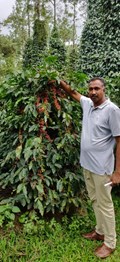
Bipin Behera, 78, of Basiapada village in Odisha's Sambalpur district's Jujumura block, was just scraping by. His few acres of land in a hilly, forested location were unusable for farming. In the coal mining areas of Angul, Jharsuguda, Sambalpur, and Sundargarh, poverty and the vicious cycle of debt had wreaked havoc on 27,000 farmer families. Things began to change in 2019 with Mahanadi Coalfields, a subsidiary of Coal India Limited, launching 'Utthan,' a community development programme (CIL).
In 40 villages, the Rs 20.3 crore CSR project has helped in the converting of barren lands into high-yielding assets and the creation of sustainable farm livelihoods, benefiting roughly 25,000 people. The project not only improved the economic situation of 6,200 disadvantaged SC/ ST/ OBC households, but it also established a model for agriculture sector development that is being replicated by the state's larger population. "Utthan's efforts are yielding positive effects in terms of livelihood," says B. Sairam, CIL's executive director (CSR).
Wadi cultivation is a new farming concept that involves intercropping with seasonal vegetables and horticulture (mango, lemon and custard apple, etc). Behera reported an income of Rs 68,000 from a half-acre farm over the course of 18 months since embracing Wadi in March 2021. Within five years of starting Wadi cultivation, he anticipates his annual farm revenue to stabilise at a minimum of Rs 60,000, once the trees give fruit to their full capacity.
Utthan has benefited 6,500 farmer households, including Behera's family. The goal of the CSR initiative, according to CIL, was to improve the socioeconomic status of 27,000 SC/ ST/ OBC people living in the project region. Utthan, which is being phased in by the Pune-based non-profit BAIF (formerly Bharatiya Agro Industries Foundation), aims to create sustainable livelihoods through a variety of innovative farm-sector interventions in agriculture, dairy, goatery, mushroom cultivation, backyard poultry, fodder development, and other areas.
By promoting sanitation, education, and menstrual hygiene, Utthan also hopes to build capacity and improve overall quality of life. In the long run, the project hopes to demonstrate a self-sustaining and inclusive growth model that may be replicated by others.
The improved fortunes of tribal villager Nala Pradhan are an example of the wide-ranging change that Utthan is bringing about. Pradhan has three acres of property. He grew paddy on two acres until 2019. The rest of the land was unsuitable for farming. Since converting to Wadi agriculture in early 2021, he has earned roughly Rs 46,000 from 28 apple and 30 mango trees on a major chunk of the bleak area. Intercropping brought in an additional Rs 60,000.
By promoting sanitation, education, and menstrual hygiene, Utthan also hopes to build capacity and improve overall quality of life. In the long run, the project hopes to demonstrate a self-sustaining and inclusive growth model that may be replicated by others.
The improved fortunes of tribal villager Nala Pradhan are an example of the wide-ranging change that Utthan is bringing about. Pradhan has three acres of property. He grew paddy on two acres until 2019. The rest of the land was unsuitable for farming. Since converting to Wadi agriculture in early 2021, he has earned roughly Rs 46,000 from 28 apple and 30 mango trees on a large portion of the barren area. Intercropping brought in an additional Rs 60,000.
Farmers pay 10% of the cost of components (fertiliser, plants, fencing material, etc.) and 40% of the cost of labour for Wadi development. Farmers pay a bigger percentage of labour costs to encourage households to provide free labour and reduce man-day losses.
There are many such Utthan success stories. Saudamini Barik, a 38-year-old OBC from Sambalpur's Birsinghgarh village, began mushroom cultivation in 2019 with 20 beds. It has since grown to 200 beds. Barik has made about Rs 1 lakh in the last year and a half.
Since vegetable production is so important in Utthan, farmers are being trained to use innovative techniques like trellis cultivation to increase productivity. This effort alone has benefited more than 500 families. Water harvesting, surface storage (50 new ponds storing 4 million litres), and the installation of eight solar pumps have boosted irrigation potential on at least 50 acres. Additionally, nearly 800 families are benefiting from animals through dairy, goatery, and poultry operations, while 600 families have established kitchen gardens to raise nutritious vegetables.
















